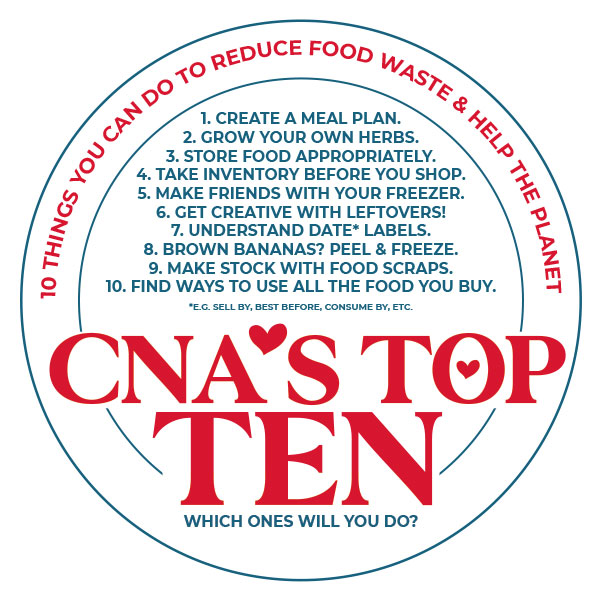Reducing Food Waste
But first, a little humor about a serious subject
Reducing food waste is a climate action goal. Here are some tips to get you started…
1. Create a Meal Plan
Planning meals for the week helps you avoid impulse purchases, reduces food waste, and saves you time during the week. Try to include versatile ingredients that can be used in multiple dishes. Batch cooking or prepping can also make your evenings easier and more efficient.
2. Grow Your Own Herbs
Fresh herbs can be expensive, and they often spoil before you can use them all. Growing your own herbs—either in a garden, on a balcony, or even on a kitchen windowsill—can provide a constant supply for your cooking. It’s easy to start with a few essentials like basil, thyme, or mint.
3. Store Food Appropriately
Proper food storage helps preserve freshness and prevents spoilage. Learn the best ways to safely store fruits, vegetables, dairy, and grains. For example, many fruits like apples and oranges last longer in the fridge, while tomatoes, potatoes and onions should be kept in a cool, dry place. Use airtight containers for leftovers to extend their shelf life.
4. Take Inventory Before You Shop
“Shop your fridge” first. Before heading to the store, check what you already have in your pantry and fridge (especially perishable foods). This ensures you don’t buy unnecessary duplicates, reduces food waste, and helps you think about creating meals from what you already have on hand. Lastly, stick to your grocery list. Impulse buys are often forgotten, then rotten!
5. Make Friends with Your Freezer
Your freezer is your best ally in reducing food waste. Freezing leftovers, extra portions, or ingredients that may spoil before you can use them (like fruit, bread, or vegetables) helps them last longer. Just be sure to label items with dates so you know when they need to be used.
6. Get Creative with Leftovers!
Leftovers don’t have to be boring! Repurpose them into new meals—like turning yesterday’s roast chicken into a chicken salad or adding leftover vegetables to a soup or omelet. With a bit of creativity, you can turn leftovers into exciting new dishes.
7. Learn How to Read Date Labels
Many people mistakenly throw away food based on “sell by” or “use by” dates, which can often be misleading. Understand the difference between these dates and what they mean for food safety. “Best before” dates refer to quality, not safety, while “sell by” is about inventory management, not expiration.
8. Overripe Bananas? Peel & Freeze Them
When bananas start to get too ripe to eat, don’t throw them away. Peel them, slice them, and freeze them. Frozen bananas are perfect for smoothies, baking, or as a healthy snack. They’re also a great way to make banana bread!
9. Make Stock with Leftover Food Scraps
Instead of throwing away vegetable peels, stems, and bones, save them to make homemade stock. Simply collect scraps in a bag or container in your freezer, and when you have enough, simmer them with water and seasonings to make a flavorful base for soups, stews, or sauces. Dispose of used or inedible scraps in your Food Scrap bin/cart (pits, peels, bones, shells, tea bags, coffee filters/grounds, and spoiled food). Participating in Sunnyvale’s FoodCycle Program helps reduce food waste “downstream”. FoodCycling keeps food out of our landfills which prevents methane creation. Your participation helps reduce this greenhouse gas that causes climate change.
10. Find Ways to Use All the Food You Buy
Avoid waste by being resourceful with all the food you buy. Use beet greens in salads or soups, and don’t throw away carrot tops—they can be turned into a salsa verde or used in stocks. Challenge yourself to use every part of the food to maximize its value.

